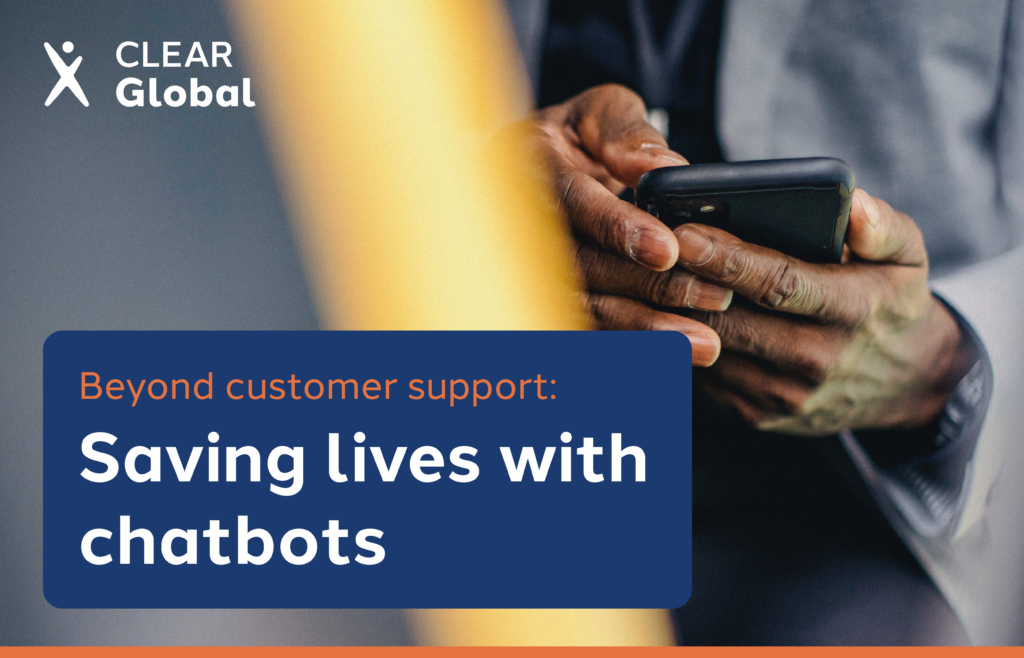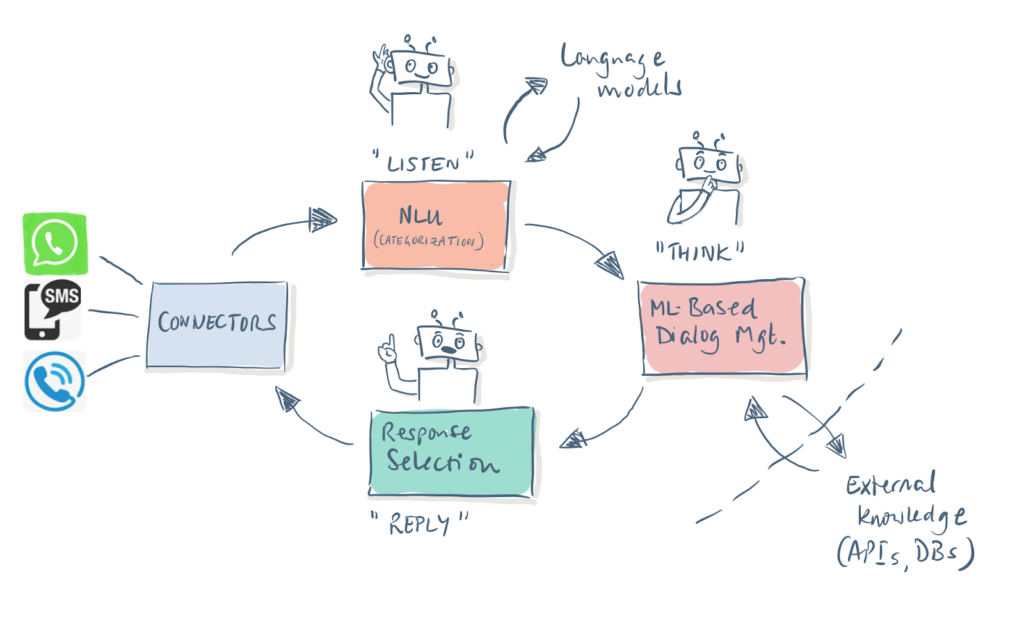Beyond customer support: Saving lives with chatbots

CLEAR Global: using chatbots for social good
At CLEAR Global, we are using chatbots to increase our social impact. Our chatbots help people get vital information and be heard, whatever language they speak. Everyone should be able to ask questions and get information they can understand, especially if it can save their lives.
Unfortunately, four billion people are digitally disconnected. They don’t have access to the communication channels we enjoy every day. Out of those four billion, those people who can access the internet are facing linguistic exclusion. For the world’s most marginalized people who face urgent challenges caused by the climate crisis, conflict, and displacement, the information they’re looking for isn’t available in their language. And they can’t take part in important conversations that concern them.
While the internet has the potential to connect us all, it’s not meeting the needs of the world’s most vulnerable people. This goes beyond educational and professional opportunities. Beyond multilingual messaging and photo sharing apps. Beyond do-it-yourself guides and online shopping. The world’s most vulnerable people are facing additional challenges – affecting their well-being and their livelihood. Simply because the tools they need are not in their language.
And we’re using chatbots to change this.
Why do we use chatbots?
Chatbots can do so much more than customer support. In industries globally, these automated conversational tools help businesses and organizations:
- reduce costs → for us, this means we can make a bigger impact at a lower cost;
- increase sales, conversions, or donations → we can raise more money to improve lives;
- improve customer experience → we can better engage with communities;
- improve response time → we can react quickly to people’s needs;
- provide 24/7, multilingual, multichannel customer support → we can reach the most marginalized communities; and
- gain valuable customer insights → we can discover what people need and want.
Chatbots give instant answers to people’s questions, so nobody has to wait in line – a crucial factor in today’s fast-paced world. For some, speed can be the difference between knowing your rights or not. Between getting lifesaving healthcare or not.
How do our chatbots help save lives?
CLEAR Global is building multilingual conversational chatbots using trusted sources to help people get the information they need to protect themselves and our planet. We share the most recent, timely, and reliable information in their language. This is critical, especially in emergencies, where misinformation and disinformation, just like no information at all, can seriously damage people’s wellbeing, and cause fear, and mistrust in supportive systems and services. Our chatbots prevent inaccurate information from spreading. They enable people to access refugee support and services wherever they go. They can help young people learn how to prevent sexually transmitted diseases, and make informed health decisions. They can make crucial advice more accessible to help someone start a business and become financially independent.
They interact with people in formats and languages they are comfortable using.
Since our chatbots respond immediately to people’s questions, they can change a life, when humanitarians are under pressure to share information quickly and effectively. Our chatbots are instantly ready to answer questions and even follow up for or with more information.
Chatbots have the power to make the internet a more linguistically inclusive place for people who don’t currently benefit from online information in their language. That’s why at CLEAR Global, our primary focus is helping marginalized communities engage in vital conversations about global issues – climate change, forced displacement and migration, women’s reproductive health and rights, and public health.
Additionally, we can:
- personalize the experience → chatbots respond with relevant answers in the right language
- enable intuitive, hassle-free communication → makes it easier to stay informed
- offer interactive ways of instant information access → engage with people in ways that work for them,
- provide 24/7 multilingual, multichannel support – and more.
So far, we’ve built:
- Uji – a chatbot that provided COVID-19 and Ebola information in the Democratic Republic of Congo. Uji spoke with people in French, Congolese Swahili, and Lingala via Facebook Messenger, Telegram, WhatsApp, and SMS. The project was done in partnership with the Ministry of Health, Kinshasa Digital, and IFRC, and ran between September, 2020 and February, 2021.
- Planeta Azul OIM – a chatbot built in collaboration with the International Office for Migration (IOM); Planeta Azul provided Venezuelan and Central American refugees and migrants in Mexico, Ecuador, and Peru with information about the IOM’s services and other relevant topics via Facebook.
- Shehu – a chatbot providing COVID-19 information to people in northeast Nigeria; it speaks English, Hausa, and Kanuri. Shehu has already exchanged over 80,000 messages with almost 5,000 people, earning a 93% trust rate. We recently relaunched Shehu in collaboration with Mercy Corps Nigeria.
- A chatbot that supports Kenyan entrepreneurs through the business registration process in English and Swahili. The chatbot is text and voice-enabled. We built the chatbot together with our tech partner, Think.
- Integreat Munich – a chatbot that speaks English, Farsi, and Romanian. We built it together with a German NGO, Integreat, and the Municipality of Munich, to help migrants and refugees access vital information when they arrive in Munich.
How do our chatbots work?
Chatbots are designed to act like people and replicate a conversation you’d have with a human being. Chatbots use artificial intelligence (AI) and natural language processing (NLP) technology to recognize and interpret your message (sentences, keywords). Since they’re fed on data, chatbots contain various kinds of information, which enables them to learn and determine what you’re saying. Using machine learning applications and pre-defined scripts (also called playbooks) set up in the back-end, chatbots can detect keywords, determine what your inquiry might be about, and then respond to your question. In case they’re unfamiliar with the terms you used in your message, a chatbot might try to start the conversation all over again or share other information it thinks you might be interested in.

Chatbots work independently from people – but, people help them learn and improve their functionality by ensuring conversational logs are well-maintained, data updated, and no technical issues occur.
Our chatbots are FUN:
- F – Fresh – content updated on a weekly basis, addresses emerging topics quickly
- U – Useful – content tuned to the specific local context to make sure it’s relevant
- N – Natural – platform uses natural language processing to engage in real conversations with users
In addition to information accuracy and timeliness, our chatbots are, above all, made for people. They are built on data collected through research and practice, so they can respond to people’s urgent needs as effectively as possible. We’ve exchanged over 100,000 messages with over 7,000 users. So we know that people trust our language technologies. When we build trust, we can help people.
We can help:
- prevent and alleviate disease outbreaks by sharing accurate health information and giving people ways to inform and protect themselves,
- adopt eco-friendly, sustainable agricultural practices, so everyone can understand the importance of planet conservation and act on it,
- women take better care of themselves and their newborns thanks to reliable communication systems and useful educational resources.
All of this through language technology.
It doesn’t stop there. We can do so much more – we can tackle so many issues, cover even more languages, and reach more local communities.
We’ve got big plans for 2023. That’s why we launched our end-of-year fundraising campaign. With “Meet me in my language”, we aim to raise $100,000, which we’ll invest in new language technology solutions.
If you want to learn more about our work or have a project or sponsorship proposal, don’t hesitate to contact us. We’re always looking for new partners and supporters. We can do more together.
We thank Microsoft for their kind Azure donation which hosts much of our language technology resources.
Written by Milana Vračar, Communications Officer, CLEAR Global
Follow CLEAR Global on Twitter and LinkedIn.
Follow the TWB community on LinkedIn, Facebook, and Instagram.